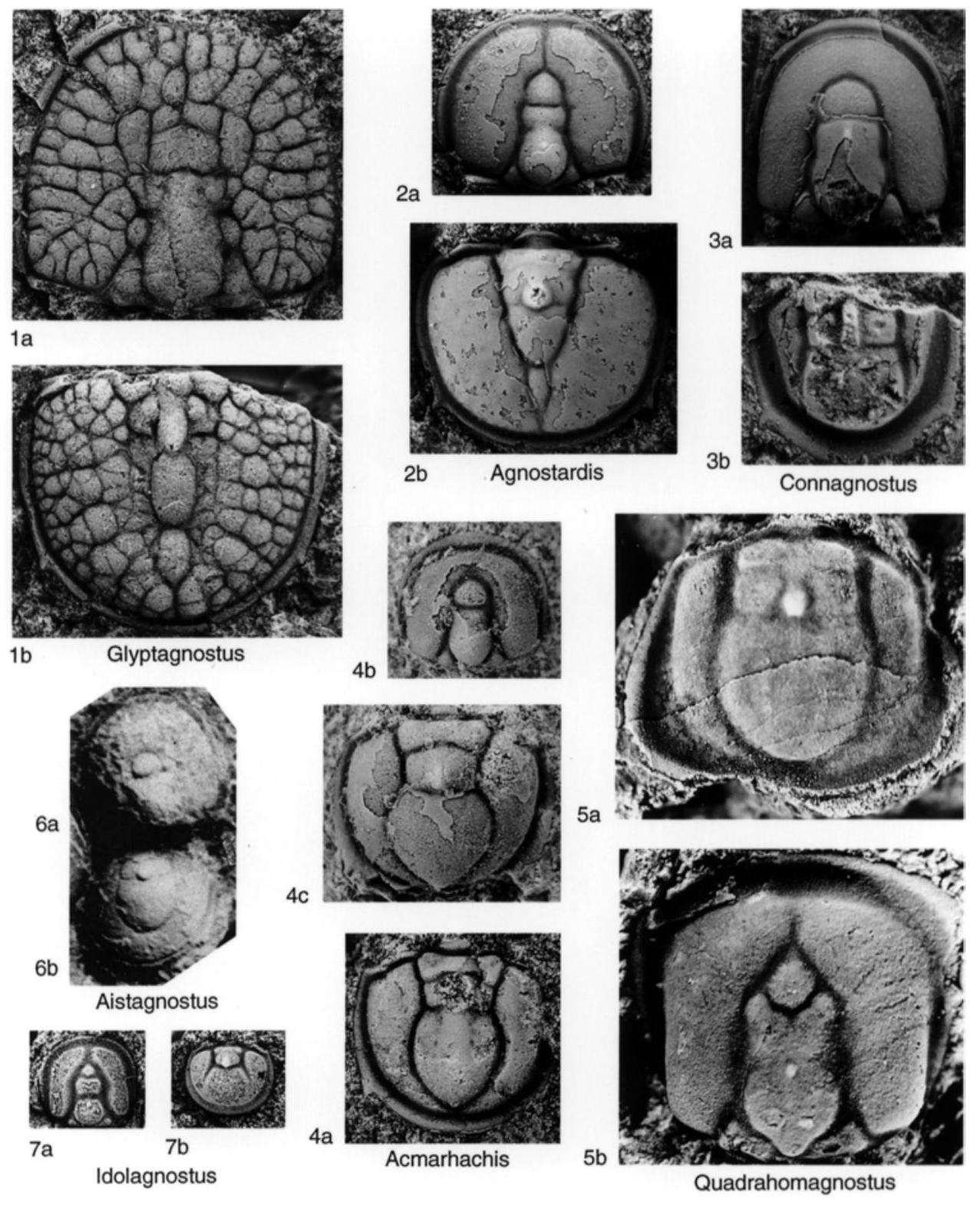Welcome to the Treatise on Invertebrate Paleontology!
Please enter a genera name to retrieve more information.

Idolagnostus
Classification
Phylum:
Arthropoda
Class:
Trilobita
Order:
Agnostida
Superfamily:
Agnostoidea
Family:
Agnostidae
Formal Genus Name and Reference:
Idolagnostus ÖРІК, 1967, p. 104
Type Species:
I. agrestis, OD, holotype (ÖPIK, 1967, pl. 60, fig. 8), CPC 5766, AGSO, Canberra
Images
(Click to enlarge in a new window)
Fig . 222,7a,b. *I. agrestis, Upper Cambrian (Mindyallan, G. stolidotus Zone), Australia (Selwyn Range district, western Queensland); a, holotype, cephalon, CPC 5766, × 8; b, paratype, pygidium, CPC 5872, ×8 (new).
Synonyms
Diplagnostidae, Pseudagnostinae
Geographic Distribution
Australia (Queensland), Mindyallan–Idamean (E. eretes to S. diloma Zones); China (Qinghai), lower Upper Cambrian.
Age Range
Beginning Stage in Treatise Usage:
Upper Cambrian
Beginning International Stage:
Guzhangian
Fraction Up In Beginning Stage:
50
Beginning Date:
498.75
Ending Stage in Treatise Usage:
Upper Cambrian
Ending International Stage:
Cambrian Stage 10
Fraction Up In Ending Stage:
100
Ending Date:
486.85
Description
Small, nonscrobiculate, median preglabellar furrow well developed to absent. Glabella with small, triangular to ogival anterior lobe, F3 well developed and nearly straight, F2 usually well developed as transglabellar furrow, straight or curved forward, glabellar node a short distance behind F2 furrow, glabellar culmination elevated, broadly rounded to obtusely angular, basal lobes of moderate size. Pygidium nonspinose, axis long, strongly constricted across M2, F1 clearly impressed, curved forward, F2 clearly impressed, deflected rearward by axial node, posterior lobe expanded, subcircular, extending to or nearly to border furrow, with or without small terminal node.
References
Museum or Author Information
Classification
Phylum:
Arthropoda
Class:
Trilobita
Order:
Agnostida
Superfamily:
Agnostoidea
Family:
Agnostidae
Formal Genus Name and Reference:
Idolagnostus ÖРІК, 1967, p. 104
Type Species:
I. agrestis, OD, holotype (ÖPIK, 1967, pl. 60, fig. 8), CPC 5766, AGSO, Canberra
Images
(Click to enlarge in a new window)
Fig . 222,7a,b. *I. agrestis, Upper Cambrian (Mindyallan, G. stolidotus Zone), Australia (Selwyn Range district, western Queensland); a, holotype, cephalon, CPC 5766, × 8; b, paratype, pygidium, CPC 5872, ×8 (new).
Synonyms
Diplagnostidae, Pseudagnostinae
Geographic Distribution
Australia (Queensland), Mindyallan–Idamean (E. eretes to S. diloma Zones); China (Qinghai), lower Upper Cambrian.
Age Range
Beginning Stage in Treatise Usage:
Upper Cambrian
Beginning International Stage:
Guzhangian
Fraction Up In Beginning Stage:
50
Beginning Date:
498.75
Ending Stage in Treatise Usage:
Upper Cambrian
Ending International Stage:
Cambrian Stage 10
Fraction Up In Ending Stage:
100
Ending Date:
486.85
Description
Small, nonscrobiculate, median preglabellar furrow well developed to absent. Glabella with small, triangular to ogival anterior lobe, F3 well developed and nearly straight, F2 usually well developed as transglabellar furrow, straight or curved forward, glabellar node a short distance behind F2 furrow, glabellar culmination elevated, broadly rounded to obtusely angular, basal lobes of moderate size. Pygidium nonspinose, axis long, strongly constricted across M2, F1 clearly impressed, curved forward, F2 clearly impressed, deflected rearward by axial node, posterior lobe expanded, subcircular, extending to or nearly to border furrow, with or without small terminal node.
